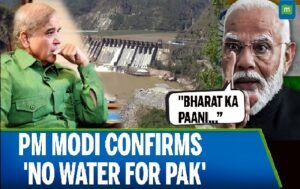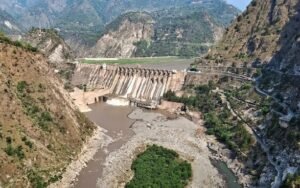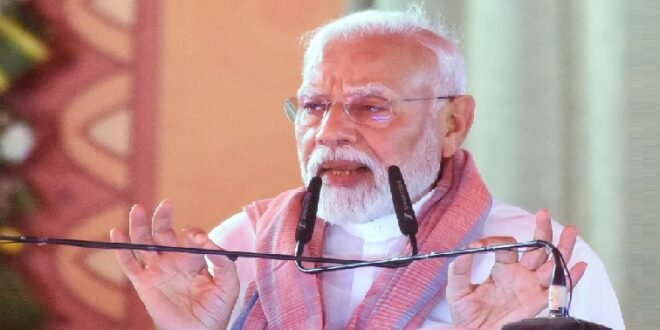23-05-2025
Bureau Report
NEW DELHI: Pakistan will not get water from rivers over which India has rights, Indian Prime Minister Narendra Modi said on Thursday, a month after a deadly attack in Indian Kashmir led New Delhi to suspend a key river water-sharing treaty between the neighbors.
 The suspension of the Indus Waters Treaty, negotiated by the World Bank in 1960, was among a slew of measures announced by India against Pakistan last month after the April 22 attack that killed 26 men, mostly Hindu tourists.
The suspension of the Indus Waters Treaty, negotiated by the World Bank in 1960, was among a slew of measures announced by India against Pakistan last month after the April 22 attack that killed 26 men, mostly Hindu tourists.
New Delhi had said the attack was backed by Pakistan, an accusation Islamabad denied and the nuclear-armed neighbors were involved in their worst military fighting in nearly three decades before agreeing to a ceasefire on May 10.
“Pakistan will have to pay a heavy price for every terrorist attack … Pakistan’s army will pay it, Pakistan’s economy will pay it,” Modi said at a public event in the northwestern state of Rajasthan, which borders Pakistan.
The Indus treaty provides water for 80% of Pakistan’s farms from three rivers that flow from India but Pakistan’s finance minister said this month that its suspension was not going to have “any immediate impact”.
The ceasefire between the countries has largely held, with Indian Foreign Minister Subrahmanyam Jaishankar saying that there is no exchange of fire currently and “there has been some repositioning of forces accordingly”.
“The (military) operation continues because there is a clear message…that if there are acts of the kind we saw on April 22, there will be a response, we will hit the terrorists,” Jaishankar told Dutch news outlet NOS.
“If the terrorists are in Pakistan, we will hit them where they are,” he added.
 There was no immediate response from Pakistan to comments by Modi and Jaishankar. India and Pakistan have shared a troubled relationship since they were carved out of British India in 1947, and have fought three wars, two of them over the Himalayan region of Kashmir, which they both claim in full but rule in part.
There was no immediate response from Pakistan to comments by Modi and Jaishankar. India and Pakistan have shared a troubled relationship since they were carved out of British India in 1947, and have fought three wars, two of them over the Himalayan region of Kashmir, which they both claim in full but rule in part.
New Delhi also blames Pakistan for supporting Islamist separatists battling security forces in its part of Kashmir, but Islamabad denies the accusation.
The arch rivals have taken several measures against each other since the April attack in Kashmir, including suspension of trade, closure of land borders, and suspension of most visas. India suspended its participation in the Indus Waters Treaty with Pakistan last month after the killing of 26 civilians in Kashmir, which New Delhi blames on Islamabad. Pakistan denies the charges, which led to the worst fighting between the countries in decades before a ceasefire was agreed last week. The treaty had survived three wars and other conflicts between the bitter rivals, while withstanding many twists and turns in diplomatic ties. Reuters reported on May 16 that Delhi is considering projects that would likely reduce the flow of water into Pakistan from rivers allocated to that country. India says it will “keep the treaty in abeyance until Pakistan credibly and irrevocably abjures its support for cross-border terrorism,” while Islamabad says “any attempt to stop or divert the flow of water belonging to Pakistan” will be an “act of war.”
The nuclear-armed neighbors disagree over use of the water from rivers that flow downstream from India into the Indus river basin in Pakistan.
The use of the water is governed by the Indus Waters Treaty, which was mediated by the World Bank and signed by the neighbors in September 1960.
The agreement split the Indus and its tributaries between the two countries and regulated water sharing. India was granted the use of water from three eastern rivers Sutlej, Beas and Ravi while Pakistan was granted most of the three western rivers Indus, Jhelum and Chenab.
 Pressmediaofindia
Pressmediaofindia




